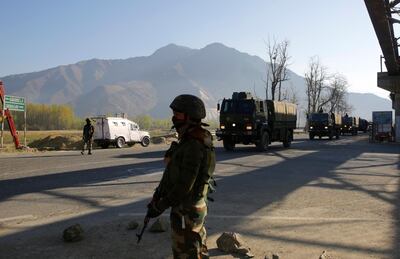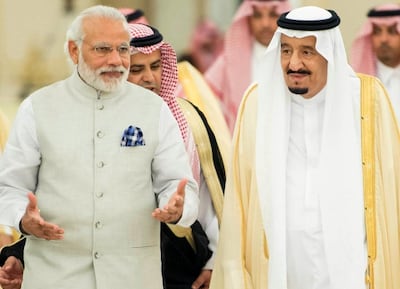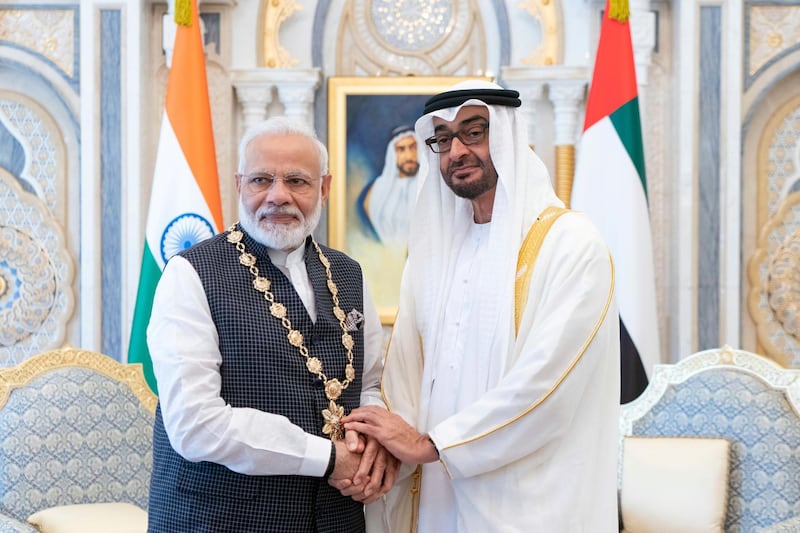Three years after the historic visit of Sheikh Mohamed bin Zayed, Crown Prince of Abu Dhabi and Deputy Supreme Commander of the Armed Forces, to India as the guest of honour during the country’s Republic Day, the time is ripe to reflect on the significance of Delhi’s revived partnership with the Gulf.
India's strengthening of ties with the Arabian Peninsula has continued in earnest over the past five years, moving beyond the traditional pillars of the relationship – energy consumption and the Indian migrant community in the Gulf – in order to reach the strategic level. The initial momentum was created in the early 2000s under the Atal Bihari Vajpayee government but the 2014 election of Narendra Modi was the real game-changer. Mr Modi took care to foster good relations in the Gulf.
In August, Mr Modi was awarded the Order of Zayed, which recognised the strong spirit of friendship and cooperation that he had nurtured between India and the UAE.
But relationships are only challenged in difficult times. In this respect, the year 2019 was marked by a series of crucial tests, the overall results of which signalled the endurance of these new ties.
The first test was the impact of India’s election last spring on past policies. In fact, Mr Modi’s Bharatiya Janata Party won a landslide victory, granting a strong level of continuity in policymaking – not only with respect to Mr Modi, but his close foreign policy advisers – particularly two of the Gulf relations early architects, Subrahmanyam Jaishankar, previously India's foreign secretary who is now minister of external affairs, and Ajit Doval, renewed for a second term as national security adviser.
The second test, and maybe the most challenging one, was India's revocation of the constitutional autonomy of the disputed state of Jammu and Kashmir last August following another clash with Pakistan over the region. Since then, Islamabad has argued that the Indian decision was a discriminatory measure targeting Muslim populations.

Malaysia, Turkey, Iran, Indonesia and Qatar convened a special meeting of the Organisation of Islamic Cooperation in Kuala Lumpur last December. These countries were unambiguous in their condemnation of India's approach to Kashmir. The contrast with the OIC's hitherto more cautious diplomatic position on the India-Pakistan conflict was stark, as the OIC tends to work behind the scenes. Furthermore, the proceedings of December's gathering revealed how the Kashmir issue has become a political card used by some countries competing for leadership within the OIC.
The third and most recent test was India's reaction vis-a-vis the military escalation between the US and Iran – an issue with direct implications for Gulf security. Despite international sanctions, Delhi has traditionally maintained ties with Tehran in both trade and military relations. However, this policy is slowly evolving.
Trade relations have been declining for several years. India is still officially involved in the development of Chabahar port but the project has slowed down. Much to India’s chagrin, Iranian officials have come to suggest that Chabahar could eventually be linked to Gwadar, a nearby port in Pakistan.
Apart from Chabahar, India is now complying with US sanctions targeting countries importing oil from Tehran, a major decision that strongly irritated the Iranian government. It may even have played a role in the latter's decision to publicly chide India's actions in Kashmir at the Kuala Lumpur Summit. India's compliance with the sanctions was also made possible thanks to Emirati and Saudi investments in Indian oil infrastructure in Mangalore and Maharashtra, which have been critical in guaranteeing the country's energy security.
All of this does not necessarily mean that India will completely shift on the Iranian file. Delhi condemned the killing of Quds Force commander Qassem Suleimani in Baghdad earlier this month, though its official statement refrained from blaming the US and called instead for restraint. Last week, Javad Zarif, Iran's foreign minister, was a keynote speaker at India's Raisina Dialogue, an annual high-level geopolitical conference, where he conveyed Tehran's views on Suleimani's assassination and the nuclear issue. All in all, India will seek to maintain limited ties with Iran.

Taken altogether, these three tests – a major election, a domestic crisis and regional tensions – could have presented broader challenges to India’s foreign policy. The fact that they did not reflects the endurance of the partnerships involved. In this perspective, the next major test will be less about regional politics and more about the ability of these countries to operationalise their relationship.
Indian policy circles see three Gulf countries as their major political partners: the UAE, Oman and Saudi Arabia. Both Abu Dhabi and Muscat have already engaged with Delhi on significant strategic initiatives such as counterterrorism exchanges and naval co-operation. As India and Saudi Arabia signed an agreement last October forming a strategic partnership council headed jointly by Prime Minister Modi and King Salman bin AbdulAziz, all eyes will be looking at how this translates to the operational level. The organisation of the first ever Saudi-Indian naval exercise next March will be a good indicator in that domain.
The elevation of this political friendship to the policy and operational levels is, in the long term, what will determine the endurance of the India-Gulf partnership.
Jean-Loup Samaan is associate professor in strategic studies with the UAE National Defence College. The views expressed in this article do not reflect those of the UAE National Defence College, the Near East South Asia Centre for Strategic Studies, nor any government





